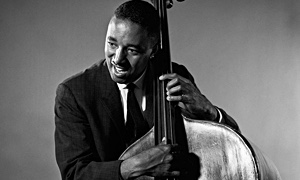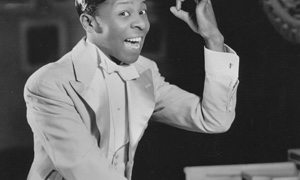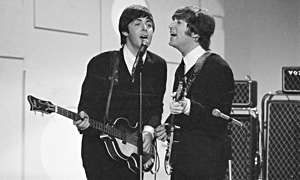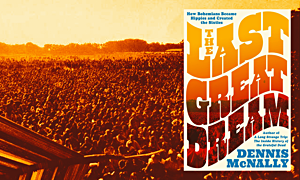Home » Jazz Articles » Book Review » Heart Full of Rhythm: The Big Band Years of Louis Armstrong
Heart Full of Rhythm: The Big Band Years of Louis Armstrong
In his latest meticulously researched biography, Ricky Riccardi mines the rich history of ArmstrongЎҜs life, loves, business, and legal affairs, and most importantly, his musical output, to reveal the unquestionable impact that the jazzman had on all of American music.
 Heart Full of Rhythm: The Big Band Years of Louis Armstrong
Heart Full of Rhythm: The Big Band Years of Louis Armstrong Ricky Riccardi
339 Pages
ISBN: # 978-0-19-091411-0
Oxford University Press
2020

Louis Armstrong
trumpet and vocals1901 - 1971
It's no exaggeration to say that many Americans felt they knew the trumpeter, due to his down-to-earth persona, the unique Satchmo patois he used publicly, and the palpable love for his audience whenever he stepped on stage, in front of a microphone, or a camera. In the book's epilogue, Riccardi argues, "At the end of the day, that is what Louis Armstrong's life was really all about: he made everybody who came to see him feel good all over." Best known for his ground-breaking small ensemble recordings in the 1920s, and his string of pop hits in the 1950s-'60s, the trumpeter's middle years, from 1928-1947, are less well known. It is this period that is the basis for Riccardi's latest work on the man known to his friends as Pops. In his latest meticulously researched biography, Riccardi mines the rich history of Armstrong's life, loves, business and legal affairs, and most importantly, his musical output, to reveal the unquestionable impact that the jazzman had on all of American music. Armstrong was acutely aware of the forces of racism and Jim Crow limits working against him daily, even limiting his ability to perform a concert in his hometown of New Orleans since his band was integrated. He chose to face these obstacles with public equanimity, although in private, Riccardi reveals, Armstrong called out racism for what it really was, a stain on the soul of his beloved America.
Riccardi's day gig is Archivist for the Louis Armstrong House Museum. In that capacity, he has spent countless hours digging through the historical record, using Satchmo's extensive archive of letters, photos, unreleased recordings, news reports, and myriad interviews with Armstrong contemporaries. What emerges is a story of an African American artist buffeted by the forces of a music industry controlled entirely by white managers, as the band leader fought to maintain his own musical identity. From the time he left New Orleans heading to Chicago in the 1920s, Armstrong lived a rough and tumble life as a black musician and band leader, literally charting new territory at a time when a highly segregated America placed strict limits on what was acceptable behaviors for every person of color, even celebrities. The book documents many of Armstrong's important firsts, each of which helped foster greater opportunities for other African American performers. In 1936 he became the first black performer to receive star billing in the

Bing Crosby
vocals1903 - 1977
At the same time, the mainstream press often reacted negatively to Armstrong's firsts, slamming film studios for giving such a prominent film role to a black man, while motion picture exhibitors in many parts of the nation refused to screen movies that featured Satchmo in a starring role. Adding to the voices marshalled against Armstrong, as the turbulent 1930s progressed, jazz critics took the performer to task for moving beyond his musical roots, as he transitioned from a jazzman leading a small ensemble playing New Orleans-inspired music, to a big band leader who routinely covered the latest Tin Pan Alley hits. Riccardi documents some of the earliest instances of the so-called "jazz wars," feuds in the press over who was playing authentic jazz, and that often criticized Armstrong for focusing on pleasing his fans rather than pushing the boundaries of the art form.
In Heart Full of Rhythm, Armstrong's complex symbiotic relationship with his white manager, Joe Glaser, is explained and analyzed in depth for the first time. Riccardi reveals just how closely each man tied his own individual fortune to the other's success. In a richly detailed chapter that explains just how Glaser saved Armstrong from threats of physical harm in 1935 when he took over the trumpeter's management at a time with two rival gangsters were battling to control Armstrong's contract, the author shows how difficult it was to making a living was for any musician in the Great Depression. A shrewd business man, Glaser would go on to shape Armstrong's career for the next thirty-five years making Satchmo the highest paid black celebrity in the world. Riccardi also unravels the mysterious roles of the trumpeter's earlier managers, Tommy Rockwell and Johnny Collins, using correspondence, numerous court records and news reports that tell their story of continued meddling in the trumpeter's career, even after Glaser took charge.
Perhaps the Riccardi's most valuable contribution to music scholarship in these pages is the detailed chronological reporting of the hundreds of recordings made between 1928 and 1947 by the bandleader. Riccardi breaks down sessions listing which songs were recorded, the producers involved and documents notable collaborators and their contributions. Artists such as

Lionel Hampton
vibraphone1908 - 2002

Dexter Gordon
saxophone, tenor1923 - 1990

Mills Brothers
band / ensemble / orchestrab.1928

Luis Russell
composer / conductorb.1902
Louis Armstrong was at the forefront of the emergence of both the swing and big band phenomena that dominated the air waves and record charts throughout this era. In this highly entertaining and well-paced biography, Ricky Riccardi brings those exciting times to life and in the process, helps to restore Armstrong to his rightful place as an innovative artist and ground-breaking African American performer. Heart Full of Rhythm makes a persuasive case that without his contributions, the sound and image of American popular music might have turned out much differently. It is a book worth reading for any fan of jazz, popular music, and American history. It also provides another lens for us to better understand the story of African Americans in establishing the culture we take for granted today.
Tags
Book Review
Keith Hatschek
Oxford University Press
Louis Armstrong
Bing Crosby
Rudy Vallee
Joe Glaser
Tommy Rockwell
Johnny Collins
Lionel Hampton
Dexter Gordon
Mills Brothers
Luis Russell
Heart Full of Rhythm
Comments
PREVIOUS / NEXT
Support All About Jazz
 All About Jazz has been a pillar of jazz since 1995, championing it as an art form and, more importantly, supporting the musicians who make it. Our enduring commitment has made "AAJ" one of the most culturally important websites of its kind, read by hundreds of thousands of fans, musicians and industry figures every month.
All About Jazz has been a pillar of jazz since 1995, championing it as an art form and, more importantly, supporting the musicians who make it. Our enduring commitment has made "AAJ" one of the most culturally important websites of its kind, read by hundreds of thousands of fans, musicians and industry figures every month.







 Buy Now
Buy Now





















